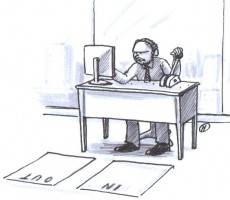September 16, 2016
CoreNet report sets out how technology will reshape corporate real estate 0
 The speed of today’s technological advances is dramatically reshaping the way that corporations manage and use their real estate. It’s a dynamic that has significant consequences for the workplace, urban development and the overall lifestyle of the average worker. Those are the unsurprising conclusions of a new report from trade association CoreNet Global, which was discussed this week at the organisation’s 2016 Summit – EMEA, held in Amsterdam. As ever, the devil is in the detail so the report is worth exploring to get a sense of just how imminent many of the changes will be, especially because they will converge to create a perfect storm of change for the workplace. This marks the new era out from the past when technology developed in more predictable ways. Several CoreNet Global Gold Strategic Partners contributed to the report including CBRE, Deloitte, ISS, JLL, Newmark Grubb Knight Frank, Sodexo and Steelcase.
The speed of today’s technological advances is dramatically reshaping the way that corporations manage and use their real estate. It’s a dynamic that has significant consequences for the workplace, urban development and the overall lifestyle of the average worker. Those are the unsurprising conclusions of a new report from trade association CoreNet Global, which was discussed this week at the organisation’s 2016 Summit – EMEA, held in Amsterdam. As ever, the devil is in the detail so the report is worth exploring to get a sense of just how imminent many of the changes will be, especially because they will converge to create a perfect storm of change for the workplace. This marks the new era out from the past when technology developed in more predictable ways. Several CoreNet Global Gold Strategic Partners contributed to the report including CBRE, Deloitte, ISS, JLL, Newmark Grubb Knight Frank, Sodexo and Steelcase.






 The corporate real estate profession will be influenced, disrupted and transformed in the years ahead by a powerful combination of forces that are re-shaping business strategy and operations, consumer preferences, and how and where people want to live and work, according to a new report from CoreNet Global.
The corporate real estate profession will be influenced, disrupted and transformed in the years ahead by a powerful combination of forces that are re-shaping business strategy and operations, consumer preferences, and how and where people want to live and work, according to a new report from CoreNet Global. 


 Just one in three IT decision makers believe advances such as cloud-based solutions, big data and wearable tech will be available in their industry within the next 12 months, according to a new study from Capita. Although the report – Trends vs Technologies – has yet to be published, the firm has released some of its findings. Based on a survey of IT professionals in the insurance, finance, legal services and manufacturing sectors, the study analyses nine key organisational trends and the implementation of related technology. The report claims that while many decision makers describe a tech trend as being relevant to their industry, several barriers to implementation mean solutions are not yet ready and in many cases might be lagging behind consumer take-up of the new technology. The trends named in the report are Big Data, Digital Workplace, Artificial Intelligence, Internet of Things, Wearable Tech, Robotics, Cloud Based Solutions, 3D Printers and Virtual Reality.
Just one in three IT decision makers believe advances such as cloud-based solutions, big data and wearable tech will be available in their industry within the next 12 months, according to a new study from Capita. Although the report – Trends vs Technologies – has yet to be published, the firm has released some of its findings. Based on a survey of IT professionals in the insurance, finance, legal services and manufacturing sectors, the study analyses nine key organisational trends and the implementation of related technology. The report claims that while many decision makers describe a tech trend as being relevant to their industry, several barriers to implementation mean solutions are not yet ready and in many cases might be lagging behind consumer take-up of the new technology. The trends named in the report are Big Data, Digital Workplace, Artificial Intelligence, Internet of Things, Wearable Tech, Robotics, Cloud Based Solutions, 3D Printers and Virtual Reality.


























May 18, 2016
What the imminent arrival of driverless vehicles will mean for the way we work 0
by Mark Eltringham • Cities, Comment, Flexible working, Technology
More →